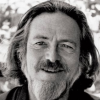The meaning and purpose of dancing is the dance. Like music, also, it is fulfilled in each moment of the course. You do not play a sonata in order to reach the final chord, and if the meaning of things were simply in ends, composers would write nothing but finales.
Alan Watts (1915-1973) Anglo-American philosopher, writer
The Wisdom of Insecurity, ch. 7 “The Transformation of Life” (1951)
(Source)
Quotations about:
path
Note not all quotations have been tagged, so Search may find additional quotes on this topic.
I must live my life, not yours, my friend,
For so it was written down;
We must follow our given paths to the end,
But I trust we shall meet — in town.Ella Wheeler Wilcox (1850-1919) American author, poet, temperance advocate, spiritualist
Poem (1879), “Advice,” st. 8, Maurine and Other Poems (1888 ed.)
(Source)
If you are looking after happiness don’t take the turnpike, take one ov the byroads, yu will avoid the tollgates, and find it less crowded and dursty.
[If you are looking after happiness, don’t take the turnpike, take one of the byroads; you will avoid the tollgates, and find it less crowded and dusty.]
Josh Billings (1818-1885) American humorist, aphorist [pseud. of Henry Wheeler Shaw]
Everybody’s Friend, Or; Josh Billing’s Encyclopedia and Proverbial Philosophy of Wit and Humor, ch. 132 “Affurisms: Chips” (1874)
(Source)
Nay, we have heard it said that there is not a quaker or a baptist, a presbyterian or an episcopalian, a catholic or a protestant in heaven: that, on entering that gate, we leave those badges of schism behind, and find ourselves united in those principles only in which god has united us all. Let us not be uneasy then about the different roads we may pursue, as believing them the shortest, to that our last abode: but, following the guidance of a good conscience, let us be happy in the hope that, by these different paths, we shall all meet in the end. and that you and I may there meet and embrace is my earnest prayer: and with this assurance I salute you with brotherly esteem and respect.
Thomas Jefferson (1743-1826) American political philosopher, polymath, statesman, US President (1801-09)
Letter (1814-09-26) to Miles King
(Source)
Where he had "heard it said" might be an 1813 letter from John Adams.
Life is full of doors that don’t open when you knock, equally spaced amid those that open when you don’t want them to.
It is good to have an end to journey towards; but it is the journey that matters, in the end.
Nearly all creators of Utopia have resembled the man who has toothache, and therefore thinks happiness consists in not having toothache. They wanted to produce a perfect society by an endless continuation of something that had only been valuable because it was temporary. The wider course would be to say that there are certain lines along which humanity must move, the grand strategy is mapped out, but detailed prophecy is not our business. Whoever tries to imagine perfection simply reveals his own emptiness.
George Orwell (1903-1950) English journalist, essayist, writer [pseud. of Eric Arthur Blair]
“Can Socialists Be Happy?” Tribune (1943-12-20) [as John Freeman]
(Source)
In relation to his public, the artist of to-day […] walks at first with his companions, till one day he falls through a hole in the brambles, and from that moment is following the dark rapids of an underground river which may sometimes flow so near the surface that the laughing picnic parties are heard above, only to re-immerse itself in the solitude of the limestone and carry him along its winding tunnel, until it gushes out through the misty creeper-hung cave which he has always believed to exist, and sets him back in the sun.
Cyril Connolly (1903-1974) English intellectual, literary critic and writer.
“Writers and Society, 1940-3” (1943), The Condemned Playground (1946)
(Source)
As the means, so the end.
Mohandas Gandhi (1869-1948) Indian lawyer, anti-colonial nationalist, political ethicist [Mahatma Gandhi]
In Young India (17 Jul 1924)
Compare to this.
My own belief is no rule for another.
John Wesley (1703-1791) English cleric, Christian theologian and evangelist, founder of Methodism
Sermon #39, “Catholic Spirit,” 1.11
(Source)
Many are stubborn in pursuit of the path they have chosen, few in pursuit of the goal.
[Viele sind hartnäckig in Bezug auf den einmal eingeschlagenen Weg, Wenige in Bezug auf das Ziel.]
Friedrich Nietzsche (1844-1900) German philosopher and poet
Human, All Too Human [Menschliches, Allzummenschliches], Part 1, ch. 9 “Man Alone with Himself [Der Mensch mit sich allein],” ¶ 494 (1878)
(Source)
This is a frequent translation of this passage, but I cannot find the original translator.
(Source (German)). Alternate translations:Many are obstinate with regard to the once-chosen path, few with regard to the goal.
[tr. Zimmern (1909)]Many people are obstinate about the path once it is taken, few people about the destination.
(tr. Faber/Lehmann (1984)]Many are obstinate with regard to the path once they have entered upon it, few with regard to the goal.
[tr. Hollingdale (1986)]











